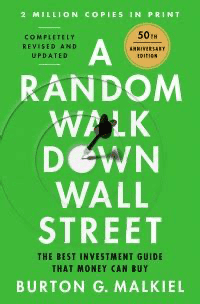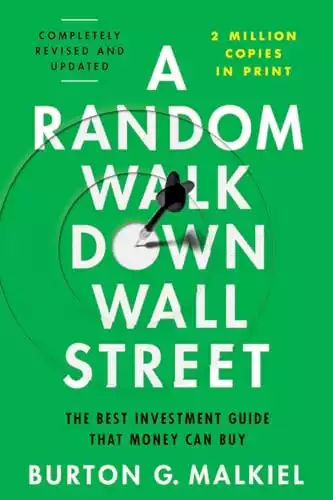Overview : A Random Walk Down Wall Street
-
Book Title: A Random Walk Down Wall Street
-
Author: Burton G. Malkiel
-
Publication Date: January 1973 (latest edition updated in 2020)
-
Rating: 4.5
-
price: $20.89
-
Pages: 496
About the Author
Burton G. Malkiel is a renowned economist and professor of economics at Princeton University. With decades of experience in finance and investing, he is best known for his advocacy of the efficient market hypothesis, and his influential book A Random Walk Down Wall Street has been a staple for investors worldwide.
Introduction to A Random Walk Down Wall Street Book
In the ever-evolving world of personal finance and investing, few books have stood the test of time like Burton G. Malkiel's "A Random Walk Down Wall Street." First published in 1973, this seminal work continues to shape how investors approach the stock market and make financial decisions. As we delve into this comprehensive review, we'll explore why Malkiel's insights remain relevant in today's fast-paced financial landscape.
What Kind of Book Is "A Random Walk down Wall Street"?
"A Random Walk Down Wall Street" is more than just a book; it's a financial education packaged into a readable, engaging format. Malkiel, a Princeton economist, challenges conventional wisdom about stock market behavior and investment strategies. At its core, the book introduces readers to the "Random Walk Theory," which posits that stock prices move unpredictably, making it difficult for even seasoned investors to consistently outperform the market.
Key Concepts
- Random Walk Theory
- Efficient Market Hypothesis (EMH)
- Passive vs. Active Investing
- Index Fund Investing
- Behavioral Finance
Features - A Random Walk Down Wall Street Features
Malkiel's work is structured to guide readers through the complexities of financial markets, starting with fundamental concepts and progressing to more advanced strategies. Here's what you can expect:
1. Historical Context
The book provides a fascinating journey through financial history, examining market bubbles and crashes to illustrate the unpredictability of stock prices. From the Dutch Tulip Mania to the more recent Dot-com Bubble, Malkiel uses these examples to reinforce his random walk theory.
2. Investment Strategies Breakdown
Malkiel critically analyzes popular investment approaches, including:
- Technical Analysis
- Fundamental Analysis
- Growth Investing
- Value Investing
His balanced evaluation helps readers understand the strengths and limitations of each strategy.
3. Case for Index Investing
A significant portion of the book is dedicated to advocating for passive index investing. Malkiel presents compelling evidence that low-cost index funds often outperform actively managed funds over the long term.
4. Portfolio Construction Guidance
Readers receive practical advice on building a diversified investment portfolio tailored to their risk tolerance and financial goals. Malkiel emphasizes the importance of asset allocation and periodic rebalancing.
5. Behavioral Finance Insights
The book delves into the psychological factors influencing investor behavior, helping readers recognize and overcome common cognitive biases that can lead to poor financial decisions.
A Random Walk Down Wall Street - Pros and Cons
Pros:
- Accessible explanation of complex financial concepts
- Time-tested investment principles
- Empowers individual investors with knowledge
- Regular updates to address current market trends
- Balanced perspective on various investment strategies
Cons:
- May discourage active investing, which some readers might prefer
- Some concepts can be repetitive across chapters
- Limited coverage of alternative investments like cryptocurrencies
A Random Walk Down Wall Street Book - User Experience
Malkiel's writing style is clear and engaging, making "A Random Walk Down Wall Street" accessible to both novice and experienced investors. The use of real-world examples and historical data helps readers connect abstract concepts to practical applications. Many readers report feeling more confident in their ability to navigate financial markets after finishing the book.
A Random Walk Down Wall Street Book Alternatives
While "A Random Walk Down Wall Street" is a cornerstone of investment literature, it's worth comparing it to other popular finance books:
- "The Intelligent Investor" by Benjamin Graham: Focuses more on value investing principles
- "Common Sense on Mutual Funds" by John C. Bogle: Dives deeper into the case for index investing
- "Rich Dad Poor Dad" by Robert Kiyosaki: Offers a different perspective on personal finance and investing
Malkiel's book stands out for its comprehensive approach and academic rigor, making it an excellent choice for those seeking a well-rounded understanding of financial markets.
Highlights from A Random Walk Down Wall Street" by Burton G. Malkiel
Efficient Market Hypothesis (EMH): Markets are efficient, meaning stock prices reflect all available information, making it hard to consistently outperform.
Passive Investing Advantage: Supports index fund investing over active management due to lower costs and reliable long-term returns.
Speculative Bubbles Warning: Highlights the dangers of market bubbles and investor irrationality, stressing the importance of a disciplined approach.
Diversification is Key: Recommends spreading investments across asset classes to reduce risk.
Long-Term Focus: Emphasizes staying invested and avoiding short-term speculation to achieve growth.
Psychological Discipline: Successful investing requires managing emotions and staying patient amidst market fluctuations.
"A Random Walk Down Wall Street" earns a strong 4.5 out of 5 stars for its enduring relevance, comprehensive coverage of investment topics, and practical advice for individual investors.
A Random Walk Down Wall Street Summary
Burton G. Malkiel's "A Random Walk Down Wall Street" remains an essential read for anyone looking to understand the intricacies of financial markets and develop a sound investment strategy. Its blend of historical context, empirical evidence, and practical guidance provides readers with a solid foundation for making informed financial decisions. While the book's advocacy for passive investing may not resonate with everyone, its insights into market behavior and investor psychology are invaluable. As the financial world continues to evolve, with developments in areas like robo-advisors and cryptocurrency, Malkiel's core principles of diversification, cost-consciousness, and long-term thinking remain as relevant as ever. Whether you're just starting your investment journey or looking to refine your approach, "A Random Walk Down Wall Street" offers timeless wisdom that can help you navigate the complex world of personal finance with confidence. In an era of information overload and market volatility, Malkiel's work serves as a steady guide, empowering readers to take control of their financial futures.





